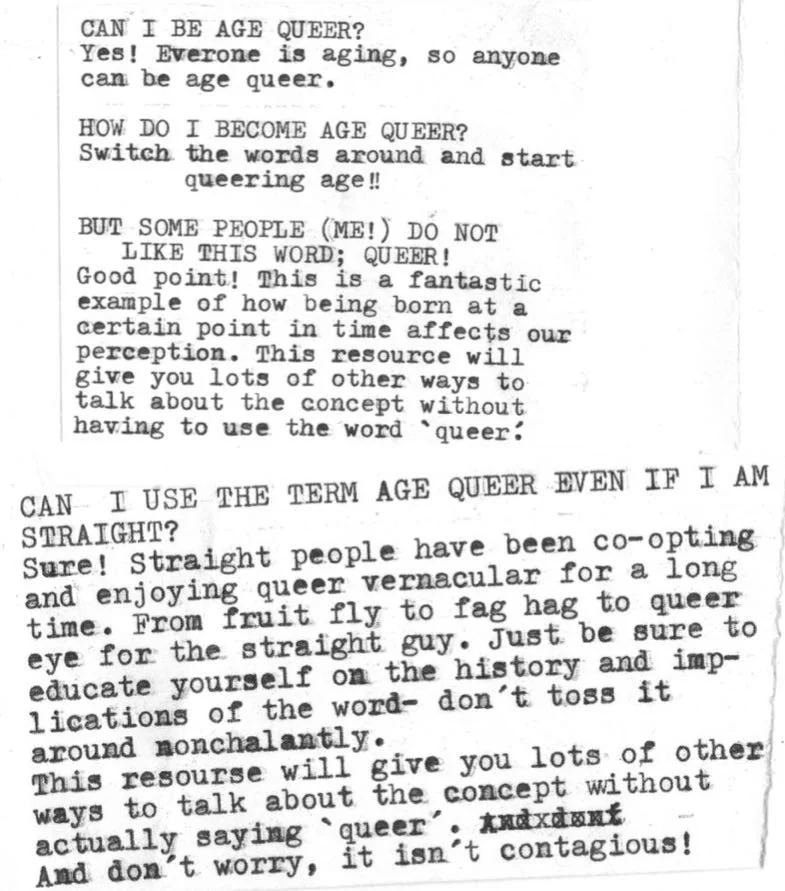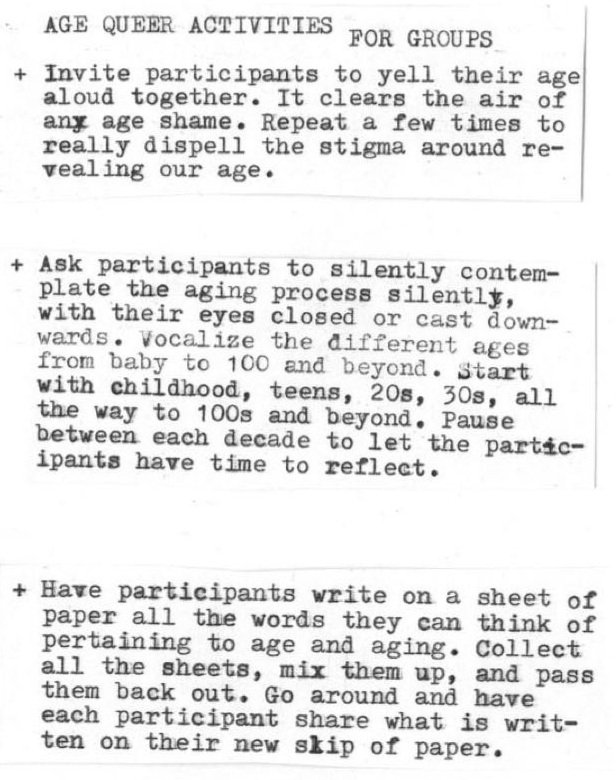I wrote this zine, Age Queer, in June 2019 as a handout for participants of a training I would be giving later that summer at the Pioneer Network Conference. In addition to my trainings being very interactive, I like to provide tangible takeaways in order to cater to different learning styles and to give people the opportunity to explore the topics on their own time- without having to use their screens. Additionally, as someone who was newly immigrated to Canada and deepening my understanding of settler colonialism, I was pretty uncomfortable with the name of the conference. So, I decided I would try to covertly address my discomfort with the glorification of the word “pioneer” within the document, while also staying on topic. The result is an imperfect attempt at infusing my work with my politics to a degree I hadn’t before. One day I would like to expand on this topic, but five years and a pandemic later I think it still holds up pretty well.
To make it more widely accessible, I also created a digital version of Age Queer for my website ageactivism.com and linked to it from a website I co-created called Old School. One of Old School’s other co-creators, Kyrié Carpenter, has also used the zine as a teaching tool in her Gero-Psych classes over the years. From these different avenues, I have received encouraging and tender feedback from all sorts of people. I have heard from people who identify as queer themselves who were happy to learn a new viewpoint of aging through a lens they deeply understood. I have also heard from people who identify as straight who were grateful to learn more about queerness in a way that they could easily relate to. I heard from people who didn’t reveal how they identified to me, but showed their appreciation all the same. We are all aging, after all, and we all do it differently.
Queerness, on the other hand, is not for everyone- and I respect that. Some people believe it is a sin, or immoral, which I disagree with. For others, because they are so deeply embedded in the heteronormative world around us, queerness is a strange “other” that they don’t feel any association with whatsoever. And I know lots of queers, some loved ones, who want to keep it that way. They do not take kindly to the invitation in this zine for straight people to use the term age queer, because doing so waters down the sanctity or potency of the word. I understand why they feel this way and I can see the logic, but my heart tells me a dogmatic approach for queerness is just as harmful as the dogmatic approach against it.
One snow day, when I was 16, I was out shoveling the driveway when I had a sudden realization: I was attracted to women. This realization, combined with the fact that I had
been called a girl since the day I was born, led me to the conclusion that I must be a lesbian. Language, especially the language I had, was much more limited back then.
This new label was just as important as the flip side was- I was not straight. Understanding of my queerness was solidifying in me years before I would use the word queer to describe it. A major takeaway, other than the excitement of entering a new world I didn’t know existed, was the understanding that I would be leaving another, much more comfortable and socially accepted one behind. That transition was confusing, freeing, and terrifying all at once.
While obviously it is not the same at all, I do believe that there are similarities between my journey to queerness and one’s possible journey to oldness. There is a shedding of society’s standards, and a new vulnerability that calls for a different type of emotional armor than we are used to. Necessary in my survival as a lesbian was the understanding of homophobia and heterosexism I was up against, just like knowledge of ageism and gerontophobia (fear of olders) and gerascophobia (fear of aging) is key to thriving as one ages. Reprinting this zine is an act of resistance against these manifestations of hate and fear, and a celebration of the lives we are living in collective care with each other.
Ryan ‘twinkle’ Backer
November 15, 2024
Plain text version:
WHAT IS AGE QUEER?
Simply put it is the refusal to conform to the social constructs of age- rejecting the young/Old binary, embracing the measurement of time without clinging to the idea that time is linear. It is not.
AGE is
rigidity
fixed
constant
boring
strange
QUEER is
loose
chaos
unnameable
strange
Both of these words bring up certain assumptions. Can you ignore the assumptions and open your mind to the many possibilities these words hold together?
CAN I BE AGE QUEER?
Yes! Everyone is aging, so anyone can be age queer.
HOW DO I BECOME AGE QUEER?
Switch the words around and start queering age!!
BUT SOME PEOPLE (ME!) DO NOT LIKE THIS WORD: QUEER!
Good point! This is a fantastic example of how being born at a certain point in time affects our perception. This resource will give you lots of other ways to talk about the concept without having to use the word 'queer:
CAN I USE THE TERM AGE QUEER EVEN IF I AM STRAIGHT?
Sure! Straight people have been co-opting and enjoying queer vernacular for a long time. From fruit fly to fag hag to queer eye for the straight guy. Just be sure to educate yourself on the history and implications of the word don't toss it around nonchalantly. This resource will give you lots of other ways to talk about the concept without actually saying queer’. And don't worry, it isn't contagious!
DO KIDS NEED TO KNOW ABOUT AGE QUEER?
Kids already know even though they may not know the term. Most kids, if not all, have the very logical sense that they wit want to grow older, which is another way of saying they want to keep living. It a is sometime in young adulthood when this gets mixed up and people begin to wish they could be 'younger' instead of just wanting to keep on living. Therefore, rejection of the age binary is great at any age, but most important for non-kids.
CAPITALISM has turned aging into a commodity, using the young/old binary as a tool to do so. It is obvious the language and culture around aging needs a major rehaul. While we are at it, let us make sure we reveal the white supremacy within the gerontological and long-term care fields.
"Decolonization is the meaningful and active resistance to the forces of colonialism that perpetuate the subjugation and/or exploitation of our minds, bodies, and lands." —TLALLI YAOTL
We must not ignore the premature deaths of the marginalized. AGE JUSTICE will never be possible until we are all liberated.
CULTURE CHANGE is only possible when those with the power and authority are question. and challenged.
As a white settler activist I recognize my own limitations to decolonizing age. I can recognize the fact that I am a white colonizer- I have benefited all my life from being of Western European_ descent. I can unlearn what I have been taught: my sense of entitlement. Then I give up that entitlement. I can learn new ways to think and act that are not oppressive to others. I can tell other white people that addressing white settler colonialism is up to everyone, not just BIPOC (black, Inidigenous people of color). It is only within this framework that we can begin to queer age.
“If you have come here to help me you are wasting your time, but if you have come because your liberation is bound up with me, then let us work together." LILLA WATSON
My queer identity, in terms or my sexuality and gender identity is in direct opposition to the heteronormative cissexist world man has created. In the same vein, being age queer is in direct opposition to the ageist world man has created.
In case you are wondering- what I do with my body, what it looks like and how I use it, is nobody’s business but my own.
Trans people, people who present their gender in unique ways, people who come out later in life, folks who strayed from gender norms in their childhood and teenage years- we all have unique aging experiences outside the prescribed life stages. I am excited to share with you just how truly liberating this is…
We are led to believe that aging over the life-course is like climbing onto and then descending from a stage. There are a certain number of steps we must take to get up there. Then, we walk to center stage to bask in the spotlight at that "perfect age". We continue to walk across just to depart on the other side, down those fateful steps we all must take in the end.
But there is no "perfect age"! And I would say no stage at all, or stages for that matter. From my experience,) and from the experience I witness of others, aging is more like a playset, with a slide, climbing bars, ladders to go up and down on, poles to slide on, ledges to jump off of and woodchips to break our falls.
AGE QUEER TIPS
+ Time is relative. Remember "this too shall pass" when things are rough and be mindful in the present moment when things are great.
+ Spend time with people of all ages.
+ Believe you will live to be 120.
+ Find the joy in every age
+ Don't believe you have to enter onto the heteronormative monogamous relationship escalator- or that you have to stay on it if you do.
AGE QUEER ACTIVITIES FOR GROUPS
+ Invite participants to yell their age aloud together. It clears the air of any age shame. Repeat a few times to really dispel the stigma around revealing our age.
+ Ask participants to silently contemplate the aging process silently, with their eyes closed or cast downwards. Vocalize the different ages from baby to 100 and beyond. Start with childhood, teens, 20s, 30s, all the way to 100s and beyond. Pause between each decade to let the participants have time to reflect.
+ Have participants write on a sheet of paper all the words they can think of pertaining to age and aging. Collect all the sheets, mix them up, and pass them back out. Go around and have each participant share what is written on their new slip of paper.
+ Repeating Questions, adapted from The Heartwork Institute... A form of inquiry done with a partner. The questions can be answered right off the top of one's head or using the previous answer as a springboard to take the next answer deeper. The form is as follows: Partner A asks Partner B the question. Partner B answers. Partner A says "Thank you-" and asks the question again. The process is repeated for 4 minutes. Partner A must remain neutral to not interfere with Partner B's answering. When time is up, the two partners trade places, with Partner B asking Partner A the question.
Possible questions; “How are you aging?" or "What is aging?” or "How does aging feel?" or “How have you aged?”
Created by Ryan Backer on an Olympia Traveller C
June 2019
www.ageactivism.com
ryanpatrickbackergmail.com
IG: trustsomeoneoverthirty






